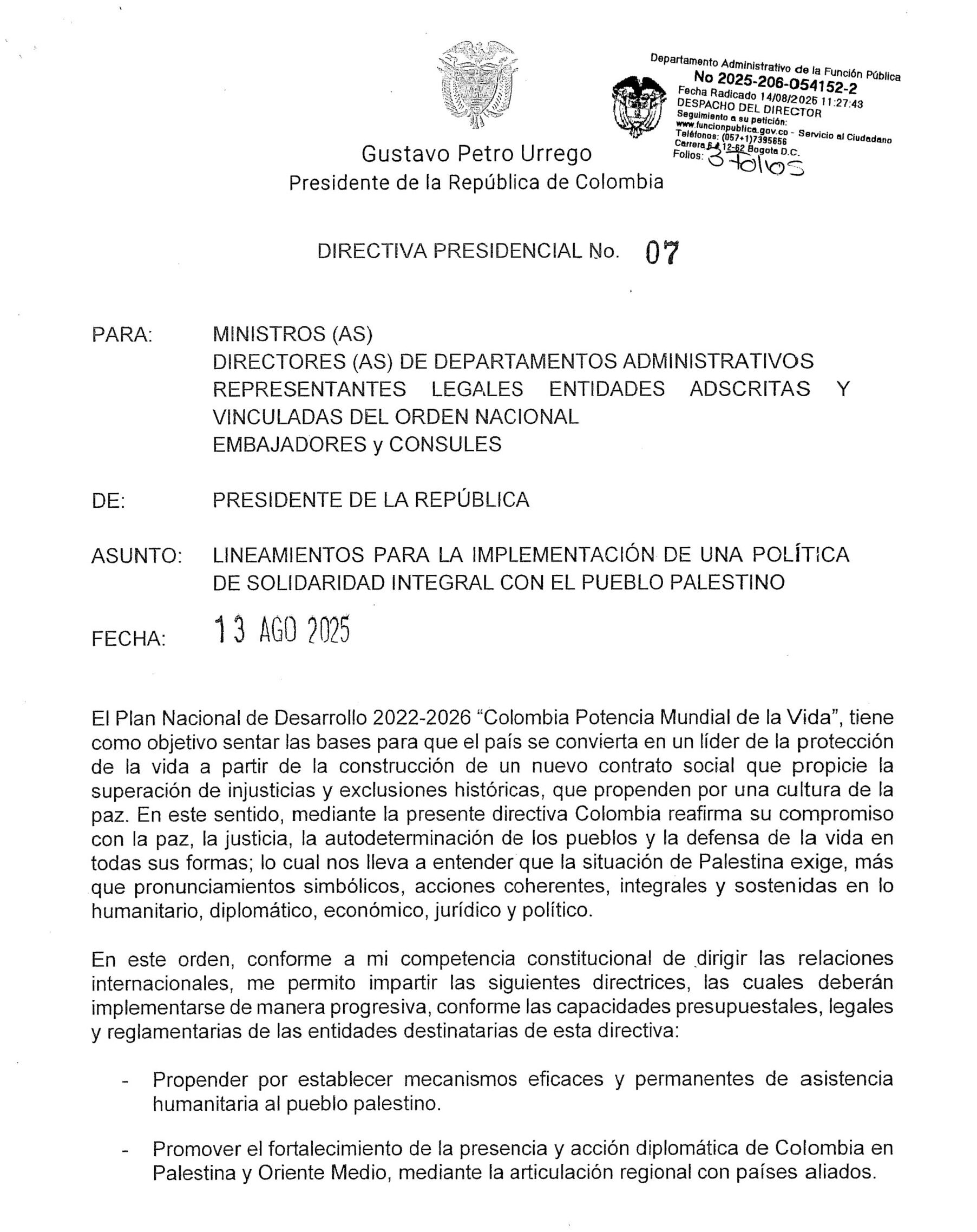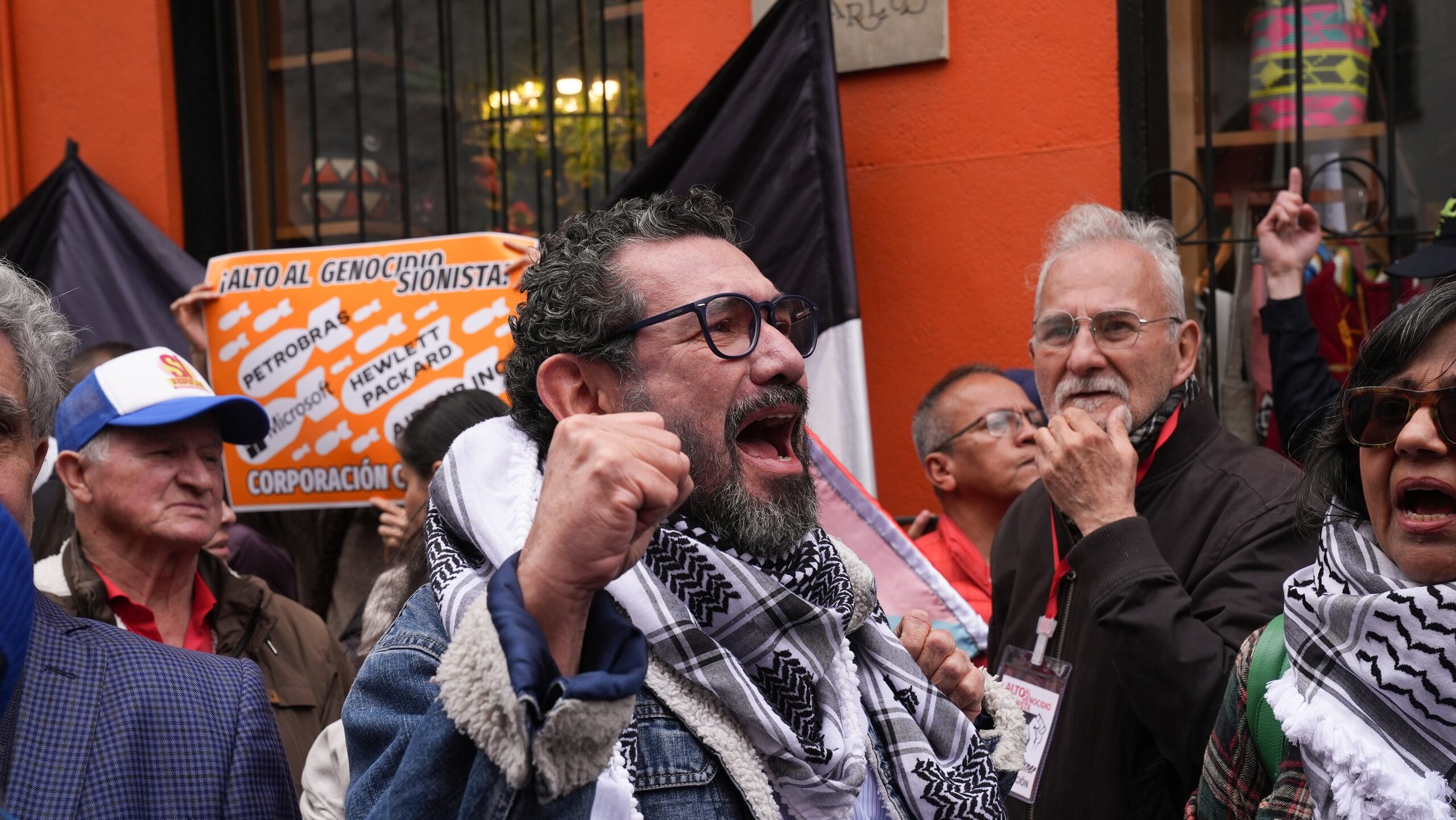TML Investigates: Colombia’s Secretive Shift Toward Palestine
The Media Line uncovers the complete text of a presidential directive embedding pro-Palestinian policies across Colombia’s state institutions, confirming its authenticity
Colombian President Gustavo Petro has signed a little-known presidential directive institutionalizing support for Palestine across the entire Colombian state, a move that has drawn sharp criticism from Jewish leaders who call it obsessive, bizarre, and disconnected from the country’s realities.
This is unprecedented at a national level
“This is unprecedented at a national level,” said Ariel Gelblung, Latin America director of the Simon Wiesenthal Center, in an interview with The Media Line. “Even Iran, which is in a state of undeclared war with Israel, does not present this as a national policy for the sake of Palestinians. In Colombia, a country without any military confrontation with Israel, this is unprecedented.”
The three-page document, signed by Petro on August 13 and labeled Presidential Directive No. 07 of 2025, was formally published in Colombia’s Official Gazette, giving it full legal validity. Yet the government chose not to amplify it through its usual communication channels. There were no social media posts, no press release, and no public announcement. For several days, only an incomplete version circulated online, missing the final page with Petro’s signature. The Media Line eventually located the full signed directive, available on a government server, confirming its authenticity.

A screenshot of the directive’s first page.
The directive goes further than Colombia’s rupture of diplomatic ties with Israel in May 2024. It embeds pro-Palestinian policies across ministries and agencies, instructing them to promote humanitarian aid for Palestinians, push pro-Palestinian positions in multilateral forums, support judicial proceedings against Israel in the International Court of Justice, review Colombian coal exports and imports of Israeli defense technologies, and integrate Palestinian narratives into the training of Colombian diplomats.
For Gelblung, the breadth of the measure reflects both the scale of Petro’s ambition and its distance from Colombia’s real priorities. “It is bizarre in general. You are talking about ministerial-level directives across different areas, as if the national policy of Colombia should revolve around this. It goes 10 times beyond what any other state would do, including one that calls itself an enemy of Israel.”
He noted that the measure fits Petro’s political style, marked by high-profile gestures and regional alliances. “He organized a summit where, after hosting in Colombia, he appeared with [Chile’s President Gabriel] Boric, [Spanish Prime Minister Pedro] Sánchez, [Brazil’s President Luiz Inácio] Lula [da Silva], and [Uruguay’s President Yamandú] Orsi. He is trying to enter that club. The difference is that in Chile, Boric has a large Palestinian community to play to. In Colombia, these gestures are empty, because there is no such community. Petro is trying to invent it.”
It is much more rhetorical than real
Give the gift of hope
We practice what we preach:
accurate, fearless journalism. But we can't do it alone.
- On the ground in Gaza, Syria, Israel, Egypt, Pakistan, and more
- Our program trained more than 100 journalists
- Calling out fake news and reporting real facts
- On the ground in Gaza, Syria, Israel, Egypt, Pakistan, and more
- Our program trained more than 100 journalists
- Calling out fake news and reporting real facts
DONATEJoin us.
Support The Media Line. Save democracy.

Marcos Peckel, executive director of the Confederation of Jewish Communities of Colombia and commissioner to combat antisemitism at the Latin American Jewish Congress, described the directive as the latest expression of what he called Petro’s “absolute obsession” with Israel. “It is much more rhetorical than real,” Peckel told The Media Line. “Beyond rhetoric, most of its provisions will not have a major impact. But it reflects the mindset of a government that is openly hostile to Israel.”
Peckel stressed that so far, the rhetoric has not translated into increased antisemitism against Colombia’s Jewish community. “We have not seen that the president’s declarations or postures have generated attacks, marginalization, or antisemitism. We maintain contacts with the government where necessary—with the Defense Ministry, the Interior Ministry, and local authorities. Several governors and mayors have even gone on missions to Israel recently, despite the absence of diplomatic relations.”
The directive’s reference to coal exports illustrates its limits. Petro had already attempted to prohibit Colombian companies from exporting coal to Israel, a move struck down by the courts. “Private companies cannot be told by the government to whom they can or cannot sell,” Peckel explained. “So it appears again in this directive, but it will have no practical effect.”
Gelblung agreed, describing the measure as desperate rather than effective. “He is trying to find something that has effect and he does not succeed. On coal, the Colombian state does not sell it, private companies do. Israel keeps receiving the coal anyway, just through other subsidiaries.”
What makes the directive more troubling, critics argue, is its potential to encourage similar moves abroad. “It is worrying because if Petro repeats this every day, making it a core theme of national policy, it may spread,” Gelblung said. “He is desperate for protagonism through measures that give him visibility. That is what this is about.”
Inside Colombia, the directive has barely registered. “The majority of Colombians neither know it exists nor care,” Peckel said. “What people do see is a president focused on Gaza instead of the serious security crises here. In Catatumbo, tens of thousands were displaced in recent months. In Cali and Antioquia, there have been violent incidents. People ask: is this the government of Palestine or the government of Colombia?”
Trade between Israel and Colombia continues under an existing free trade agreement, which Petro has not denounced. To terminate it, he would require congressional approval, which is unlikely. “Commerce has been affected more by the hostile environment than by legal measures, because such measures are not possible,” Peckel explained.
Meanwhile, Colombia still has a citizen held hostage in Gaza: Elkana Bohbot, kidnapped during the Hamas assault on October 7, 2023, and now approaching 700 days in captivity. Petro has never demanded his release. “The president has not once condemned Hamas, nor once demanded the release of the hostages,” Peckel said. “We have a Colombian national in those tunnels, and the government seems to care very little.”
Gelblung contrasted Colombia’s stance with other Latin American countries, where leaders have pushed hard against Israel but have stopped short of similar measures. He pointed to Brazil, where President Lula da Silva has withdrawn from the International Holocaust Remembrance Alliance while maintaining working ties with Israel. “Brazil ideologically does not like Israel, but it avoids acting against its own interests. It still accepts Israeli help to detect terrorist infiltrations,” he said. “That is why Brazil has not broken relations. It is a contrast anyone can understand.”
For Israel, the larger concerns lie elsewhere. “Chile bothers Israel, Colombia bothers Israel, but Brazil bothers much more,” Gelblung explained. “And Mexico is also very worrying. You now have a monument in Mexico City that says ‘Palestine will win from the river to the sea’ put up in front of the Museum of Memory and Tolerance, without authorization. That is an example of how pro-Palestinian extremism is tolerated there.”
Despite Petro’s activism, both Gelblung and Peckel emphasized that the directive may not survive long. Colombia will hold parliamentary elections in March 2026 and presidential elections in May. “Whoever wins will be different from Petro, even if the left wins,” Peckel said. “It is even possible that a left-wing candidate would reestablish relations with Israel. Security cooperation has always been critical for Colombia, and Israel has always been seen as a main ally in that area.”
Gelblung noted that the recent elections in Bolivia showed a significant shift, with over 80% of the population backing parties opposed to socialism and ties with Iran. “That is good news against all this,” he said. “Depending on what happens in Chile, we may see a very different Latin American paradigm by 2026.”
For now, though, Colombia remains unique. A democracy thousands of kilometers from the Middle East, with no Palestinian diaspora of political weight, has become the first country to enshrine pro-Palestinian activism as formal state policy through a presidential directive. Critics say it will do little for Palestinians, nothing for Colombians, and everything to serve Petro’s personal agenda.
This is a directive that does not benefit a single Colombian citizen
As Peckel put it, “This is a directive that does not benefit a single Colombian citizen. It was written, drafted, and signed discreetly because it could have a negative reaction. It is more about demonizing Israel than helping Palestinians. And that says it all.”

